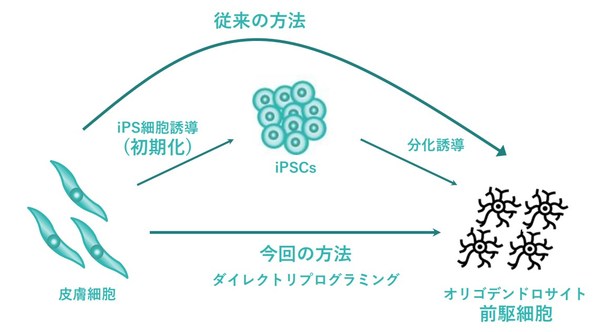 |
PALO ALTO, Calif., Sept. 21, 2022 /PRNewswire/ -- Koji Tanabe of I Peace, Inc. (https://www.ipeace.com) and a researcher Hiroko Nobuta of the University of California, San Francisco (currently assistant professor at Rutgers University) successfully achieved the direct reprogramming: the direct and rapid transformation of Dermal fibroblasts into Oligodendrocyte precursor cells by inducing four genes into the cells. This research was jointly conducted with Prof. Wernig at Sanford University and Prof. Rowitch at UCSF. The research was published in the online edition of an academic journal "Development" on June 24th.
Oligodendrocytes are cells that form myelin around the axons of neurons, which act as insulators surrounding the neurons and accelerate the rate at which electrical signals flow. Abnormalities in oligodendrocytes cause cerebral leukodystrophy. The production of a large number of oligodendrocytes is necessary for understanding its pathology, drug discovery, and transplantation medicine. The conventional method of inducing differentiation of human iPS cells or ES cells into oligodendrocytes is inefficient and requires a long time for differentiation induction. Therefore, it has required high cost for the transplantation medicine and the clarification of the pathology, which hinder the development for early treatment and drug discovery. In addition, transplantation treatment has accompanied with problems such as the possibility of tumor formation due to contamination of undifferentiated cells.
In this study, we have successfully transformed dermal cells into oligodendrocyte precursors without undergoing the stem cell state. Surprisingly, oligodendrocyte precursors produced directly from dermal cells finally differentiated into functional oligodendrocytes that wrapped around neurons to form myelin sheaths both in vitro and in vivo mouse brain after transplantation. Furthermore, we successfully reproduced the clinical condition in vitro using oligodendrocyte precursors cells generated from dermal cells of a patient with Pelizaeus-Merzbacher disease (PMD), a type of congenital myelination failure. PMD is a developmental disorder that occurs in children and is caused by an abnormality in the oligodendrocyte specific gene PLP1. It is known that the gene abnormality causes oligodendrocytes to die in the brain during differentiation, which prevents myelination. At present, there is no fundamental treatment for the disease, with only palliative treatment for symptoms such as movement impairment, spastic paralysis, and epilepsy. The direct reprogramming from this study successfully reproduced the pathological condition within a significantly reduced production time, which will surely accelerate drug discovery and development in the future.
The oligodendrocyte precursor cells produced in this study have been proven to engraft in the mouse brain after transplantation and wrap around neurons. Therefore, they are expected to be technically applied to transplantation regenerative medicine for other congenital myelination failure disorders and myelinopathy (multiple sclerosis, optic neuromyelitis, etc.) which effective treatments are rare.
The link to the article published in the journal Development is as follows:
https://journals.biologists.com/dev/article/149/20/dev199723/275808/Generation-of-functional-human-oligodendrocytes
The Rowitch and Wernig labs have declared no financial interest in the company and that the company did not fund the research.
Researcher Hiroko Nobuta established a laboratory at Rutgers University in New Jersey in September 2020. She works for drug discovery and regeneration research for myelin diseases using oligodendrocytes created by the direct programming.
https://cabm.rutgers.edu/research/nobuta-lab
I Peace, inc.
I Peace, inc. globally develops sales of GMP iPS cell and entrusted manufacturing services of medical grade cells. The company was founded in 2015 by Koji Tanabe, a graduate of Professor Shinya Yamanaka's laboratory at Kyoto University and the second author of the paper that reported the successful establishment of the world's first human iPS cell line. Tanabe has been involved in iPS cell research since the early days of its development, and is daily working on innovative technical development to make iPS cells accessible to everyone through I Peace, inc.
Our unique technology enables us to produce multiple donor-derived iPS cells in parallel without contamination concerns and to provide a large number of iPS cells at a reasonable price. We support drug discovery and cell medicine development by providing our iPS cell and other cell products as high-quality cell products that meet PMDA and FDA standards to pharmaceutical companies and cell medicine development companies. We are also promoting the production of iPS cells for individuals so that everyone in the world can prepare for the future by possessing his or her own iPS cells. We support pharmaceutical companies and cell medicine development companies so that cell medicine will be within the reach of patients as soon as possible. We aim the soonest prevalence of the regenerative medicine by establishing iPS cell banking services for individuals.
I Peace, Inc.
Founder・CEO:Koji Tanabe
Established:2015
Headquarter:Palo Alto, California, U.S.A.
Subsidiary in Japan:I Peace, Ltd., Kyoto
iPS cell manufacturing base : Peace Engine Kyoto, Kyoto
Website : https://www.ipeace.com
Media contact:press@ipeaceinc.com












